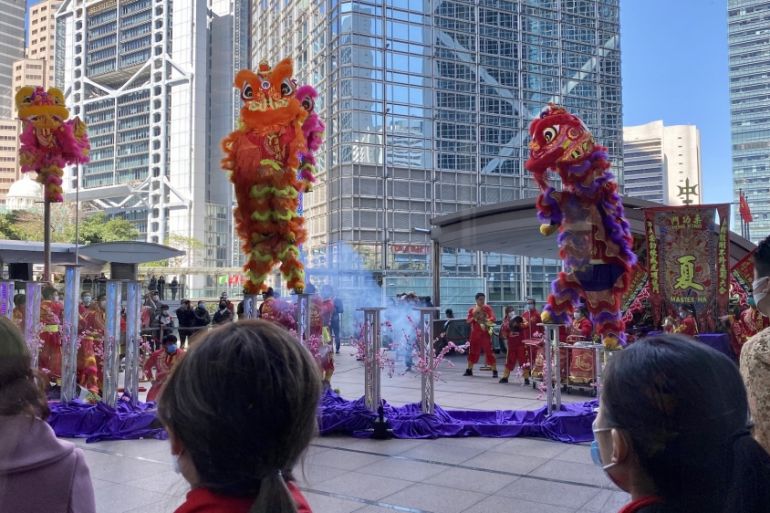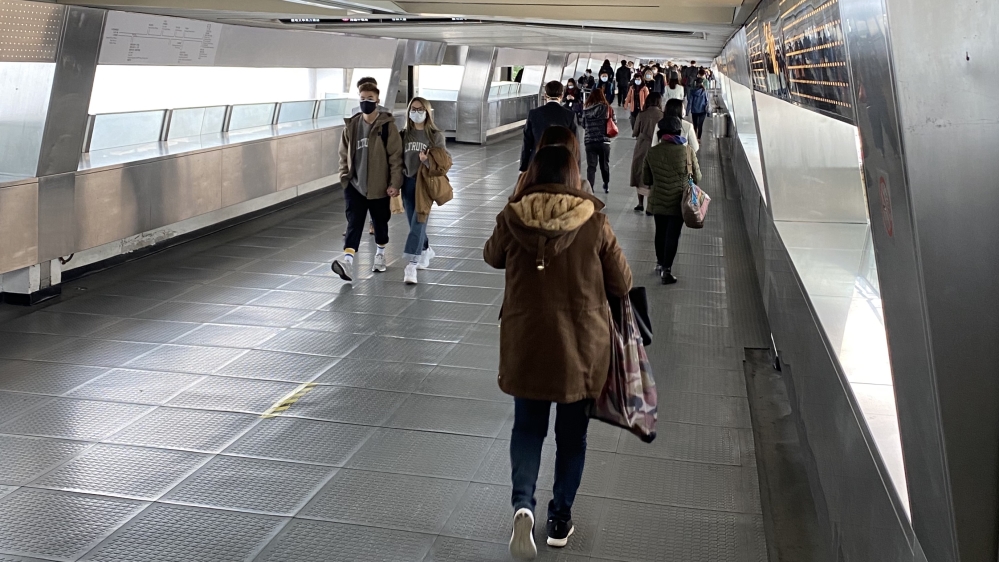On the ropes: Hong Kong’s economy reels from virus pain
The city’s shops and tourism industry are feeling the worst of the coronavirus’s economic effects.

Hong Kong, China – The Lunar New Year is supposed to be a time of renewal and positive energy. For Hong Kong, the first few weeks of the Year of the Rat in the Chinese calendar have been anything but a celebration of those things.
The city was just regaining some stability after more than six months of frequently violent pro-democracy protests, when a new coronavirus struck mainland China, infecting tens of thousands of people, and killing hundreds.
Keep reading
list of 4 itemsMexico’s teachers seek relief from pandemic-era spike in school robberies
‘A bad chapter’: Tracing the origins of Ecuador’s rise in gang violence
Why is the US economy so resilient?
Shops, restaurants, and the travel and tourism sector now appear to be even more vulnerable than they were just a couple of months ago.
Brian Au Yeung, director at Mytouragent Ltd, books flights, hotels, visas and tours for international and Hong Kong-based clients. He told Al Jazeera that his business survived all the months of protests, but the virus could be a bigger problem.
“Around Chinese New Year, business drops a little, that’s usual. We’ve already sold most of the tickets, and issued them last month.” Au Yeung said. But he notes that since then, it’s been much worse, with no new bookings, only cancellations, and 16 bookings refunded so far.
Hong Kong’s economy had already entered its first recession in 10 years even before the outbreak, with the latest figures showing that the economy shrank by 1.2 percent over the course of 2019.
The forecasts for 2020, however, vary widely, showing just how uncertain experts are as to how the virus could affect the economy.
For instance, Dutch bank ING says Hong Kong’s gross domestic product – the total value of all the finished goods and services produced in the territory – could go from its current projection of an abysmal 5.8 percent contraction to a marginally worse shrinkage of 5.9 percent.
That makes The Economist Intelligence Unit’s forecast of growth of 0.5 percent to 1 percent seem positively rosy, although the research group revised its numbers down from an earlier forecast of 2.1 percent.
Hong Kong’s finance chief Paul Chan warned that the duration of the virus outbreak will dictate just how bad things get for Hong Kong’s economy.
“It is estimated that the epidemic situation will greatly increase the risk of continued economic contraction this year,” Chan said in his first weekly blog of February. “As this will cause a decrease in government revenue and an increase in expenditure, it means the fiscal deficit may rise further.”
‘Triple whammy’
The government has announced a fund of 10 billion Hong Kong dollars ($1.3bn) to help the city tackle the virus.
“The Hong Kong economy has been hit by a triple whammy of the US-China trade war, anti-government protests and now the coronavirus,” Peter Lewis, a financial consultant and host of the popular Money Talk radio show on local broadcaster RTHK, told Al Jazeera. “This is a very bad recession for HK which is likely to be very deep and protracted.”

But beyond the economic numbers, the outbreak has forced an uneasy extension to the Lunar New Year holidays – originally scheduled to last from January 25 to 29 – and disrupted Hong Kong’s famously frenetic pace of life. There are noticeably fewer people out and about. Those who do venture out mostly wear masks and avoid others in public – practises familiar to anyone who lived through the 2002-2003 outbreak of severe acute respiratory syndrome (SARS).
The government has suspended schools, kindergartens and many universities until March at the earliest. Public sector workers – other than those in the emergency services and other essential sectors – were first told not to go to their offices until the start of February, and are now being instructed to work from home.
Major banks including HSBC, Commercial and Standard Chartered have limited their opening hours, or have shut branches temporarily – with customers urged to use online banking.
Government-run museums, sports facilities and immigration services such as visa processing have been suspended until further notice. Even the Hong Kong postal service stopped for a time, but has reopened with limited hours.
Post office employees reported to local media that at the start of February, about 8,000 packages were held up at the airport, 80 percent of them containing face masks, judging by declaration details. People have been queueing to buy masks, but they’ve sold old out in many shops and pharmacies.
Retail in need of therapy
Though Hong Kong is famed for its shopping, its retail sector has become one of the worst-hit parts of the economy, as it faces a double whammy of the outbreak and the protests before it.
Retail sales fell by 19.4 percent in December compared with the same month in 2018, according to the latest available government figures. Analysts say they see further declines on the horizon.

Iris Pang, an economist for Greater China at ING, said in a research note she expects sales to fall by 30 percent year-on-year until April.
The exception to the retail nightmare, however, are supermarkets. They are having to restock shelves more frequently. As Betty, a checkout clerk at a big chain, told Al Jazeera: “It’s been busy. Very busy.”
ING’s Pang says supermarkets are likely to see growth across China. “Some companies, such as supermarkets may be able to tap into the fact that people are staying at home. It is more likely that ‘wet markets’ [likely to be the source of the virus], will be avoided and that supermarket goods will be ordered online,” said in an emailed note.
But it is not just local Hong Kongers who are staying away from shops. Part of the reason for the crash in sales is the plunge in travellers coming to the territory.
To stop the virus’s spread into Hong Kong, the territory’s government has dramatically reduced border crossings from the mainland, leaving only Shenzhen Bay and the HongKong-Zhuhai-Macau bridge open. Ferries are also suspended.
While some flights continue, several airlines have halted operations to China and a few to Hong Kong, such as US carriers United Airlines and American Airlines, due to a drop in demand. Virgin Australia has stopped the route completely.
Hong Kong’s flagship airline Cathay Pacific is decreasing flights to the mainland by 90 percent, and internationally by 30 percent – a drop in business so severe that it’s appealed to 27,000 employees to take three weeks of unpaid leave.
Albert Francis Park, head of the economics department at the Hong Kong University of Science and Technology (HKUST) told Al Jazeera: “Cathay Pacific and other airlines with many flights to China are being severely affected by the current health crisis, and are understandably trying to reduce losses by cancelling unprofitable flights and furloughing workers.”
But despite the turmoil the airline is going through now, Park says the long-term prospects still appear to be positive.
“These challenges adversely affect profits but secular trends of increased travel should enable airlines to recover robustly after the crisis subsides,” he said.
A weakened pillar
Tourist arrivals in Hong Kong had shown a glimmer of a revival in December, as visitor numbers climbed to 3.2 million from 2.6 million in November, even as anti-government protests continued.
But looking at those numbers on a yearly basis shows the extent of the damage caused by the demonstrations. Compared to a year earlier, the December figure for all tourists was down by more than half, with a 53 percent plunge recorded in people coming from mainland China, according to data from the Hong Kong Tourism Board.

And all this happened before the virus struck.
Hong Kong considers tourism to be one of the four pillars of its economy, along with trading, and financial and other professional services. Inbound and outbound tourism contributed 4.5 percent of Hong Kong’s economic activity in 2018, and employed 6.6 percent of its workforce.
“For the Hong Kong economy, which was already badly hit in 2019 by the negative impact of political protests on the tourism and retail sectors, mainland Chinese tourism visits are now expected to fall further in early 2020 due to the decision by the Hong Kong SAR [Special Administrative Region] government to restrict mainland Chinese tourist visitors,” wrote Rajiv Biswas, Asia-Pacific chief economist at research firm IHS Markit, in a note to clients.
“Consequently, the impact of the Wuhan virus epidemic is likely to further increase the negative shocks to the Hong Kong economy in the near term,” he added.
Looking further down the line, HKUST’s Park says how the government reacts to the ongoing social unrest – triggered by anger over a now-withdrawn bill that would have allowed for suspects to be extradited to mainland china – is more likely to have a larger bearing on the Hong Kong economy than the virus.
“The coronavirus is likely to be a temporary setback, but extended lack of progress in addressing political unrest could have longer-term impacts if global companies and elite talent lose confidence in Hong Kong’s future,” Park said.
But Mytouragent’s Au Yeung says he sees his business remaining depressed for months to come, and he blames the outbreak more than anything else.
“Everybody is now afraid to go out for work, shopping or normal activities, since there are no surgical masks in Hong Kong that people can buy. So people are going to change their flight tickets or refund their tickets”.
He continued: “The Wuhan virus is absolutely more serious than the anti-extradition protests, since this will stop all kinds of business in Hong Kong and China.”
The Year of the Rat symbolises strength and vitality for people across the region, underscoring their capacity for survival in the face of threats.
People in Wuhan city are suffering the most from the direct impact of the coronavirus.
But Hong Kong’s people and economy also need all the strength they can muster to recover this time.